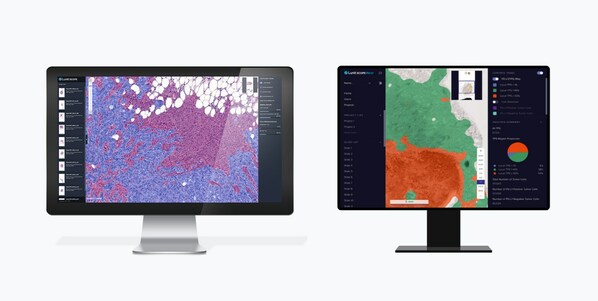 |
– Lunit and collaborators demonstrate the predictive value and analytical prowess of Lunit’s AI-biomarker platform in a wide range of cancer types and clinical practices
SEOUL, South Korea, May 10, 2023 /PRNewswire/ — Lunit (KRX:328130.KQ), a leading global provider of AI-powered cancer diagnostic solutions, today announced the presentation of 16 abstracts featuring its AI-biomarker platform at the American Society of Clinical Oncology (ASCO) Annual Meeting, to be held in Chicago, Illinois, on June 2-6.

Lunit AI-biomarker platform ‘Lunit SCOPE IO’ and AI-based PD-L1 scoring algorithm ‘Lunit SCOPE PD-L1’
Since 2019, the company has been releasing groundbreaking findings based on its AI-powered tissue analysis platform, Lunit SCOPE, at the ASCO annual meeting. At this year’s ASCO, Lunit plans to showcase the largest number of studies in the company’s history, including 10 poster presentations and 6 online publications. The studies will cover a range of topics, from predicting clinical outcomes to analyzing tumor microenvironments in various cancer types using the Lunit SCOPE suite.
Some of Lunit’s highlighted abstracts at ASCO 2023 include:
- A study conducted in collaboration with the National Cancer Center Hospital East (NCCE) found a correlation between tumor-infiltrating lymphocyte (TIL) density change during chemoradiotherapy (CRT) and pathologic complete response (pCR) rate in locally advanced rectal cancer (LARC), indicating the potential of Lunit SCOPE IO to predict favorable outcomes
- Lunit SCOPE IO analyzed TILs in head and neck squamous cell carcinoma (HNSCC) patients treated with durvalumab +/- tremelimumab, showing improved outcomes due to increased immune inflammation
- Lunit SCOPE IO validated the efficacy of neoadjuvant HPV vaccine and immunotherapy of HPV+ head and neck squamous cell carcinoma (HNSCC) patients
- A collaborative study led by Mayo Clinic predicted prognosis in patients with colon cancer by applying AI-derived immune phenotypes
- A study showing how Lunit SCOPE IO predicts the efficacy of immunotherapy based on the patient’s Transforming growth factor-beta (TGFβ) level
- The use of Lunit SCOPE IO to predict MET pathogenic mutations in non-small cell lung cancer
- The use of Lunit SCOPE UIHC (Universal Immunohistochemistry) for exploring target cancer types and predicting response to novel tumor-associated antigens (TAA) targeted agents
- Using AI to analyze the spatial arrangement of macrophages within tumor environments and how it relates to the Interferon Gamma (IFNG) signature and immune phenotype across different types of cancer
“We are thrilled to showcase the largest number of studies in the company’s history at ASCO 2023, demonstrating Lunit SCOPE’s efficacy,” said Brandon Suh, CEO of Lunit. “Through our novel academic research using Lunit SCOPE suite across various cancer types and treatment settings, we aim to bring cutting-edge technology to the forefront of optimized cancer treatment for all patients.”
Visit team Lunit at Booth IH21. Reach out to schedule a meeting at (oncology@lunit.io).
Lunit’s Abstracts at ASCO 2023
|
No. |
Abstract No. # |
Title |
Type |
|
1 |
3608 |
Poster |
|
|
2 |
2578 |
Poster |
|
|
3 |
6075 |
Poster |
|
|
4 |
3542 |
Poster |
|
|
5 |
2585 |
Poster |
|
|
6 |
e13578 |
Online Publication |
|
|
7 |
3135 |
Poster |
|
|
8 |
2621 |
Poster |
|
|
9 |
e20520 |
Online Publication |
|
|
10 |
1049 |
Poster |
|
|
11 |
e21179 |
Online Publication |
|
|
12 |
4162 |
Poster |
|
|
13 |
6100 |
Poster |
|
|
14 |
e14657 |
Online Publication |
|
|
15 |
e13553 |
Online Publication |
|
|
16 |
e13546 |
Online Publication |
About Lunit
With AI, Lunit aims to ‘conquer cancer,’ one of the leading causes of death worldwide. Lunit is an AI software company devoted to developing AI solutions for precision diagnostics and therapeutics, to find the right diagnosis at the right cost, and the right treatment for the right patients. Lunit, a portmanteau of ‘learning unit,’ is a deep learning-based medical AI company devoted to developing advanced medical image analytics and data-driven imaging biomarkers via cutting-edge technology.|
Founded in 2013, Lunit has been acknowledged around the world for its advanced, state-of-the-art technology and its application in medical images. Its technology has been recognized at international AI competitions surpassing top companies like Google, IBM, and Microsoft. As a medical AI company with a focus on clinical evidence, the company’s findings are presented in major peer-reviewed journals such as the Journal of Clinical Oncology and JAMA Network Open, and global conferences including ASCO and AACR.
After receiving FDA clearance and the CE Mark, Lunit INSIGHT CXR and MMG are clinically used in approximately 2,000 hospitals and medical institutions across more than 40 countries. Lunit SCOPE PD-L1 is CE marked in Europe and has not been cleared or approved by the US Food and Drug Administration (FDA) and is intended for Research Use Only. Lunit is headquartered in Seoul, South Korea with offices and representatives around the world.
About Lunit SCOPE
Lunit SCOPE is a suite of AI-powered software that analyzes tissue slide images for digital pathology and AI biomarker development, with the aim of optimizing workflow and facilitating more accurate and predictive clinical data for clinicians and researchers.
Lunit SCOPE platform offers multiple tissue analysis AI software products and assays that can streamline digital pathology workflow and diagnostics, as well as enhance the drug development process.
The flagship product, Lunit SCOPE IO, generates immune phenotype reports based on H&E analysis and provides AI-based predictive clinical outcome information. In addition, services are also offered by assessing protein expression via Immunohistochemistry (IHC) slide analysis, through products such as Lunit SCOPE PD-L1, Lunit SCOPE HER2, Lunit SCOPE ER/PR, and others.

